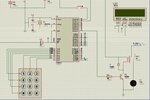isabella
Junior Member level 3
Hi guys!
I am using a 3X4 keypad and an lcd display for this project. Its quite simple. When a number is pressed on the keypad, a certain message must be displayed on a lcd screeen. Example: 10. = hello world, 11= goodbye world.
The # key is ENTER and the * key is CLEAR.
Can someone help me with a sample code?
I'm using MPLAB and C18.
I am using a 3X4 keypad and an lcd display for this project. Its quite simple. When a number is pressed on the keypad, a certain message must be displayed on a lcd screeen. Example: 10. = hello world, 11= goodbye world.
The # key is ENTER and the * key is CLEAR.
Can someone help me with a sample code?
I'm using MPLAB and C18.
